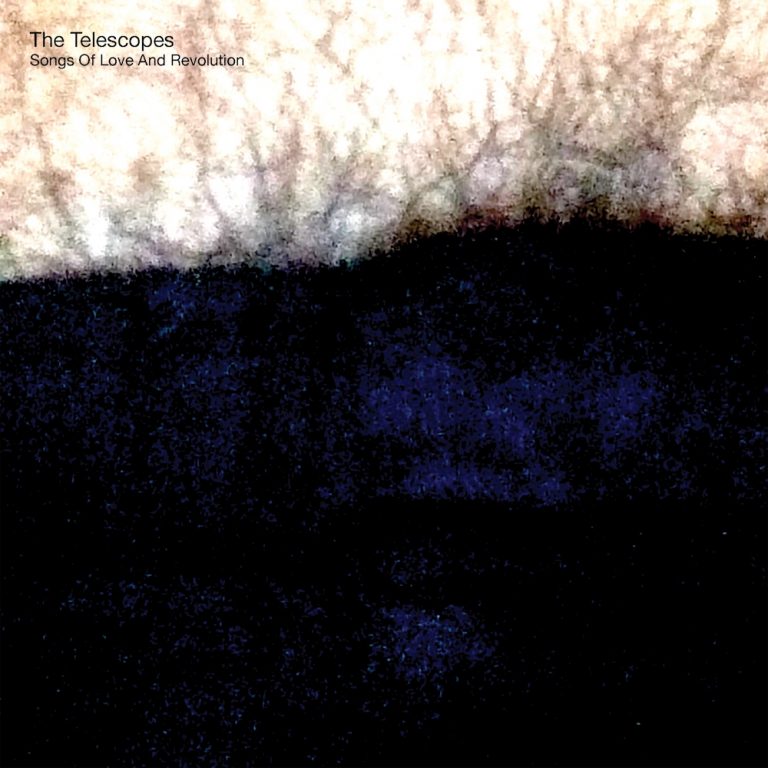In 2002, Stephen Lawrie and Jo Doran reunited for their first album as The Telescopes in nearly a decade. The new sound they presented on Third Wave was far removed from what fans of the band had come to expect from their late 80s and early 90s output, as they pushed the experimentation and droning to the forefront, with a humbled approach to lyricism and accessibility. Lawrie, now the figurehead, has carried the mantle through every iteration, which has seen a handful of departures in the two decades since their return. The Telescopes of 2021 are certainly not what they were on their 1989 debut Taste.
Songs of Love and Revolution, the band’s 12th album, comes after a decade of reinvention and experimentation. 2013’s HARM featured two near-20-minute epics, but 2015’s Hidden Fields marked a surprisingly pop-influenced detour, before Lawrie pushed the band to a higher plain on 2019’s beautifully droned Exploding Head Syndrome. All these pieces feel strategically situated like dominos, with all of them leading up to Songs of Love and Revolution. All the arrangements on their latest take influence from their 2010s material, but this time around every element coexists with one another, creating a sublime noise bath.
The deception of the production makes Songs sound like a quiet record, but the thick fuzz of opener “This is Not a Dream” possesses a slow build that subtly leads right into distortion. Lawrie’s minimal lyricism and monotone delivery is purposeful, used entirely as an additional instrument that only enhances the noise. There are no choruses or hooks in a traditional sense, he just harmonizes with the strings. On “Strange Waves”, a reworking of their 2019 single, he practically hums the lines “Strange waves / question everything /question everything,” and then lets the haze float through the rest of the track. There’s very little out there that sounds like The Telescopes these days, and “Strange Waves” is a prime example of how an artist can truly release oneself to the music. While this isn’t new for Lawrie, Songs takes their last decade of music and really lays it on thicker.
“Mesmerised” focuses on the ‘love’ aspect of the album’s title, as Lawrie comes into focus, singing “There in your beautiful soul / there in your rock n roll / there in your wonderful sky.” True to its name, “Mesmerised” has a hypnotic tone, with steady drum beating replete with shimmers and splashes of grandeur. “Come Bring Your Love”, on the other hand, toys with our emotions via its pendulum swinging melody as it inches us closer and closer to the cliff’s edge. Then, when Lawrie is done with us, he shoves us off into this blissful serenity – a breakdown that Sonic Youth and the Velvet Underground wished they’d written.
Songs like “Mesmerised” and “The Train” harness repetition for its powerful grasp on our psyche. The unrelenting and cacophonous production makes Songs sound much lower than it is, a strategy that commands us to crank the volume and appreciate every nook it has to offer. As a result, it’s easy to get lost in Songs of Love and Revolution – moments can pass quickly, and the drifting-away feeling isn’t a mistake. The Telescopes have never been like their contemporaries; there’s hardly any comparison to be found between them and My Bloody Valentine or Slowdive – they exist entirely in a genre of their own.
Songs of Love and Revolution finds a home, a warm center, that crossroads between shoegaze, noise rock, ambient fuzz, and believe it or not – pop. In fact, this could be Lawrie’s most accessible album to date, and that’s taking into account Hidden Fields‘ closeted pop. That’s the beauty of what Lawrie’s been doing for so long; he can drag us out into space slowly with “You’re Never Alone With Despair”, then drag us backwards through a cornfield on the following “We See Magic and We Are Neutral, Unnecessary”. Songs seems to be the culmination of what The Telescopes have strived for over the last decade, and is an album that’s more truly shoegaze than the genre has seen in years.

